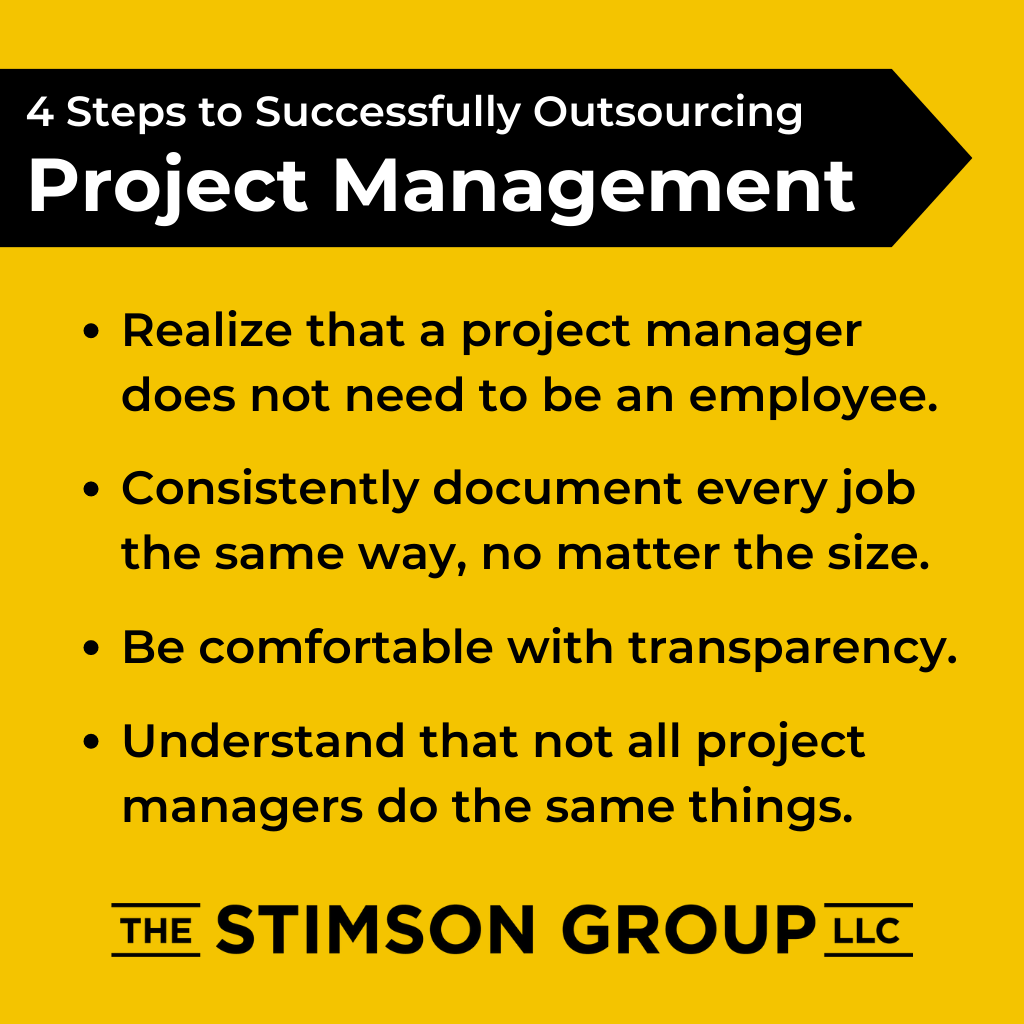
Whenever I talk to a business owner about changes they can make to achieve success, the one thing they don’t want me to bring up is project management. It’s a third rail in our industry. When it’s mentioned, everyone freaks out.
The title “project manager,” honestly, is meaningless. People think project managers manage projects, which makes sense. But in your business, what are the project managers actually managing?
They’re not managing projects. They’re walking projects through your system because your processes don’t do enough. A project manager in our industry is typically the person who does everything sales, operations, and finance don’t.
The fact that project managers exist in your business means your processes don’t work.
I’m not telling you to get rid of your project managers, but I am telling you to reduce the scope of work a project manager has to do to get your jobs done correctly. When you do this, you’ll understand that you can outsource project management.
I can’t see you right now, but I know you’re shaking your head. Your project managers are the backbone of your company. They’re out doing site surveys; they’re in meetings with the salespeople; they’re putting budgets together. The list goes on.
Your project managers are finding products and solutions, hiring freelancers, booking travel, and scrubbing orders. They make sure jobs are prepped and loaded correctly, and they run shows. In short, your project managers are doing everything, which means you need a lot of them.
However, when you have a lot of project managers, you unleash inconsistency because you haven’t defined the project management process. You might have five project managers who all do their jobs a little differently. If you define the process, all the project managers will have to follow the same steps, and some of them aren’t going to like it.
That’s a big reason why this is a third rail. You don’t want to talk about project management because you’re afraid of losing project managers, and they’re the key to you doing more jobs. But having numerous project managers in the first place indicates that you don’t know how to do more jobs.
I’m telling you this for your own good: You can outsource project management. Before I tell you how, you need to redefine what project management is so you can make it work for you.

Project Management Is a Process
Project management is not a job; it’s a process. Once you understand this, you need to define the project management process to get an order through your system and remove the places where you need an extra person to get it done.
For instance:
- If you’re using a project manager to do site surveys, you need a sales organization resource to do site surveys.
- If you’re using a project manager to take change orders from the customer, you need better account management processes.
- If you’re using a project manager to hire freelancers or book travel, you need better procurement processes.
- If you’re using a project manager to coordinate inventory allocation and asset utilization, you need better planning resources.
What I’ve just described is the fundamental structure of a scalable organization: a sales group, a planning group, and a procurement group. The collaboration of these three groups delivers a project that’s ready to be executed by a — wait for it — project manager.
If you’re in the event business, the project manager is now a lead technician or production manager for an event. Most of the pre-production work has already been done. Now the project manager can go out and manage the job.
What we’re doing here is taking the idea of a project manager and compressing it into someone who is solely focused on execution. They’re no longer responsible for selling, planning, and procuring jobs. They’re only interested in how a single job was planned, procured, and sold — note the use of past tense.
The people in sales, planning, and procurement treat all jobs equally. Project managers take what sales, planning, and procurement have done and apply it to a job. The project manager now comes in at the end of the process.
From there, it’s a pretty short leap to hiring an outside project manager. The outsourced project manager devotes time prior to the show to:
- Have a meeting with the salesperson who sold the job.
- Talk to the planning team.
- Review the orders, contracts, and drawings so they can convey them to the show crew.
There are lots of good freelance show leads, project managers, show directors, stage managers — whatever you want to call them. Your responsibility is to hand them a well-vetted job.

4 Steps to Successfully Outsourcing Project Management
1. Realize that a project manager does not need to be an employee.
Even 25 years ago, when I was a lead project manager, I was a freelancer. I reject the notion that a good project manager has to be an employee of the business.
2. Consistently document every job the same way, no matter the size.
If you’re like most people in our industry, you tend to skip steps in small jobs.
Look at your project management process from sales to delivery — you’ll find that you’re using the same template for both large and small jobs. There will be times when a section of the template isn’t applicable, but it should nevertheless be considered.
The key is to document every job the same way. Be sure the project manager can see that every point was considered, even if the consideration led to a “not applicable” designation.
That way, when something goes wrong on site, the project manager will be better prepared to deal with it.
3. Be comfortable with transparency.
Freelance project managers will be responsible for your numbers. They’ll be fiscally accountable in terms of recording hours, tracking expenses, and making sure good decisions are made. They need information in order to do that.
If you think the business of your business should only be shared with inside employees, go back to Step #1. You need to know how to deliver information to freelancers the right way so they can get the job done.
4. Understand that not all project managers do the same things.
When hiring a freelance project manager, you only need to hire the talent that applies to the job at hand.
This means you can have multiple tiers of project managers. You could have project managers who are just good at running crews. You could have project managers who are great at managing clients and calling shows. You could have project managers who are excellent at complex logistics and schedules. You could have project managers who can install rigging systems.
The list goes on — but you don’t need all your freelance project managers to do all of these things.
You only need to hire project managers with the skills a particular job requires. That’s going to save you money.
Final Thoughts
The next time you’re approached about outsourcing project management, don’t freak out.
Why? Because now you’re thinking like the owner of a scalable business. Doesn’t confidence feel good?





Leave a Reply